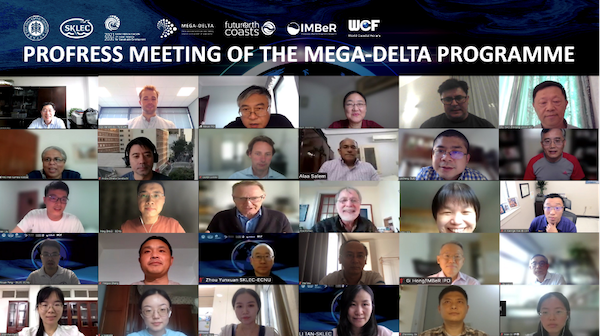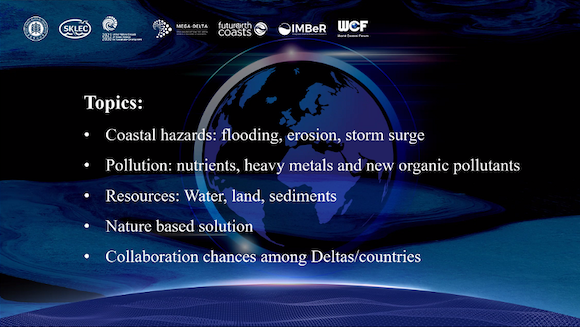The progress meeting of the Mega-Delta Programme, hosted by the State Key Laboratory of Estuarine and Coastal Research (SKLEC), East China Normal University, was held online on June 7, 2022. Fourteen scientists from China, the Netherlands, UK, Pakistan, Brazil, Egypt, USA, and Canada presented their progress in research, and more than 80 participants from all over the world attended this meeting. Prof. Qing He, Director of the State Key Laboratory of Estuarine and Coastal Research, delivered a warmly welcome speech.
Prof. Qing He congratulated the opening of the progress meeting of the Mega-Delta Programme. She mentioned that the world deltas are under great pressures such as reduced sediments and excessive nutrients inputs from the catchment, frequent storm surges from the sea, as well as land subsidence, reclamation and flooding at the deltas. In response to these global issues, the Mega-Delta Programme of UN Ocean Decade aims to support sustainable development in delta regions associated with large rivers, through collaboration among different disciplines and stakeholders. It plans to understand the current status of global river deltas, explore the mechanisms of delta evolution under the influence of global climate change and human activities, predict future trends of water-sediment and socio-economic evolution, as well as early warning for hazards, and provide solutions for common problems, such as sea level rise, coastal erosion, flood disasters, salt water intrusion, soil and water pollution, and ecosystem degradation.
Prof. Qing He briefly introduced the development of the Mega-Delta Programme since its endorsement by the UN Ocean Decade in June 2021. The implementation plan was developed with the partners, and the official website for the "Mega-Delta Programme" was set up. In August 2021, an online kick-off meeting for the Mega-Delta Programme was held. In October 2021, the “International Joint Laboratory on Estuaries and Coasts” was approved by the Shanghai government to conduct collaborative research with partners in Bangladesh (Ganges Delta), Pakistan (Indus Delta), Egypt (Nile Delta) and Romania (Danube Delta). At the same time, a Sino-Pakistan joint research project was also granted by the Ministry of Science and Technology, China. In addition, the Mega-Delta Programme is also actively interacting with other partners, such as SCOR-China, Future Earth Coasts, World Coastal Forum, Coastal-SOS project and GEF-FAO Estuary project etc. Scientific data for major river deltas has been collected and will be archived online for share with partners. Scientific Steering Committee, Advisory Committee and Executive Committee are also in planning.
As the leading institute of Mega-Delta Programme, the State Key Laboratory of Estuarine and Coastal Research in East China Normal University (ECNU) decided to hold this meeting aiming to promote understanding of the partner deltas of Mega-Delta Programme and introduce new progress in scientific research. Therefore, this symposium is of great significance for the sustainable development of world deltas.
The 14th World Oceans Day, on 8 June 2022, highlights the theme “Revitalization: Collective Action for the Ocean”. In line with this theme, the progress meeting of Mega-Delta Programme conducted in-depth discussions on the pressures that deltas are faced with.
Prof. Fangli Qiao from the First Institute of Oceanography, Ministry of Natural Resources, China introduced about the new mechanism of coastal upwelling system induced by tidal mixing, which is a key process for sediment dynamics and marine ecosystems. Prof. Jiaxue Wu from Sun Yat-sen University reported why coastal hypoxia is persistent in the coastal patchy waters, demonstrated locations where seasonal hypoxia frequently occurs, and how fine particle resuspension affects hypoxic levels. Dr. Z. George Xue from Louisiana State University introduced about the Gulf-COAWST, a regional earth system modeling platform and its applications for the Mississippi- Gulf of Mexico system.
Prof. Shu Gao from Nanjing University and Prof. Leicheng Guo from East China Normal University presented the human and tidal effects on the Changjiang Delta and Ganges-Brahmaputra River Delta in the Anthropocene. Prof. Paul Liu from North Carolina State University reported the challenges that Asian major deltas are facing with case studies from the Mekong and Irrawaddy deltas, such as land subsidence, mangrove reduction, saltwater intrusion, sand mining and coastal retreat. Prof. Daniel R. Parsons from the University of Hull reported the relationship between sediment supply, sand mining and delta sustainability, and pointed out that channel bed-level lowering induced by anthropogenic sediment starvation is the primary factor driving tidal extension upstream in the Mekong delta.
Dr. Samina Kidwai, Director of the National Institute of Oceanography, Pakistan introduced about the research programs since 2009, and challenges faced at the Indus River Delta, such as coastal erosion, mangrove degradation and decreased fishery production. Prof. Alaa Salem from Kafrelsheikh University presented the anthropogenic impact on the coastal lagoons of Nile Delta, and considered that water drainage and reclamation induced the shrinkage of lagoons (1972-2019), as well as reduction of fish resources. Both deltas are faced with reduced sediment and water input from the catchment due to damming.
A. Prof. André Oliveira Sawakuchi from the Institute of Geosciences of Universidade de Sao Paulo reported the past and present changes of environment and climate in the Amazon River basin, under the pressures from deforestation and damming.
Dr. Quirijn J. Lodder, the principal adviser on coastal flood risk management at Rijkswaterstaat, Ministry of Infrastructure and Water Management, the Netherlands, and external lecturer of Delft University of Technology, introduced the sediment management as an adaptation strategy for the sandy coast of the Rhine/Meuse delta to sea level rise. Dr. Gijs Hendrickx from Delft University of Technology reported nature-based solutions to mitigate salt intrusion and its effects. Prof. Donald Forbes from the Geological Survey of Canada, Bedford Institute of Oceanography, presented the Management of short-term flooding and long-term inundation in a large Arctic river-mouth system, Mackenzie Delta, Canada. Prof.Ian Townend from University of Southampton reported a management concept of coastal resilience. The management strategies can provide good examples for other deltas with similar problems.
At the end of the meeting, a warm discussion session was held. Participants agreed to develop further collaborations in the management of hazards and resources, carbon sequestration and micro-plastics, etc. The most important purpose is to avoid potential problems which has already existed in other deltas. In the meanwhile, some of the scientists suggest to expand the programme to places such as the Russian deltas along the Arctic coast, Greenland, Niger River Delta, and Congo Estuary.


